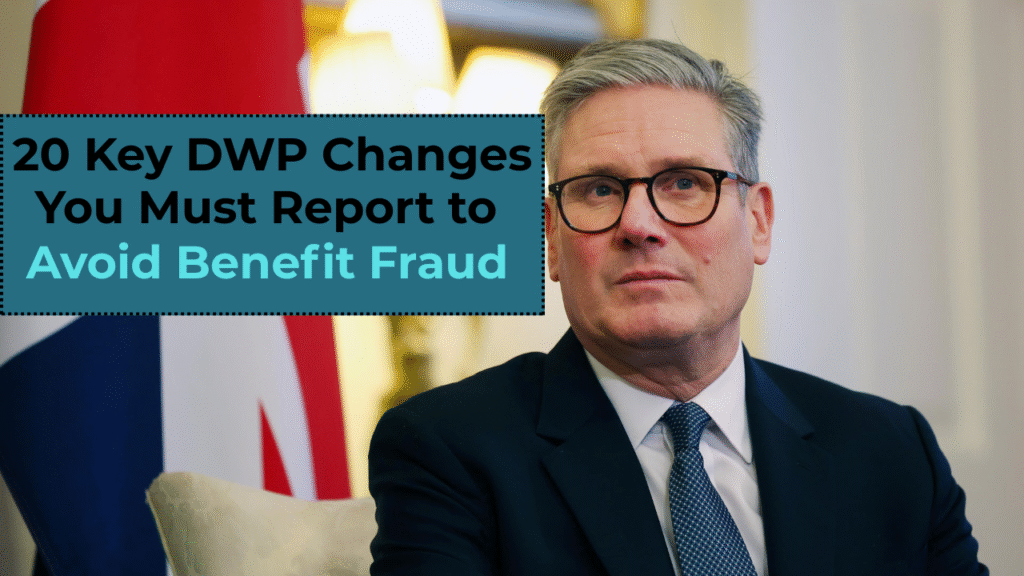Understanding the Risks of Benefit Fraud
Millions of people across the UK rely on benefits provided by the Department for Work and Pensions (DWP) to help support their day-to-day living. But what many claimants don’t realise is that failing to report certain changes in your circumstances even accidentally can lead to accusations of benefit fraud, fines, and even prosecution.
To stay on the right side of the law, it’s crucial to inform the DWP immediately if your situation changes in any way that could affect your entitlement.
Here are 20 key changes you must report if you’re receiving benefits from the DWP.
What Is Benefit Fraud?
Benefit fraud occurs when someone deliberately gives false information or fails to report changes to get or continue receiving benefits they’re not entitled to. This can include exaggerating your needs or not updating the DWP when your circumstances improve.
The penalties can be severe: repayment of overpaid benefits, financial penalties, and in serious cases, criminal prosecution.
Who Needs to Report Changes?
Anyone receiving benefits such as Universal Credit, Personal Independence Payment (PIP), Employment and Support Allowance (ESA), Jobseeker’s Allowance (JSA), Housing Benefit, or Carer’s Allowance, among others, must report relevant changes.
Reporting is not just a legal duty it ensures the system remains fair for everyone.
20 Changes You Must Report to the DWP
1. Change of Address
Whether you move to a new home within the same area or to a different town, you must inform the DWP. It can impact housing costs, council tax reductions, or local housing allowances.
2. Change in Household
If someone moves in or out of your household, including a partner, flatmate, or dependent, this could affect the benefits you’re entitled to.
3. Starting or Ending Work
Even part-time or temporary work must be reported, along with self-employment or voluntary work that might indirectly benefit you financially.
4. Change in Income
Any increase or decrease in income — whether from employment, pensions, or other sources must be declared. Even small increases can affect benefit calculations.
5. Changes in Savings or Capital
If your savings or assets increase above a certain threshold (usually £6,000 or £16,000 depending on the benefit), this must be reported immediately.
6. Change in Relationship Status
Getting married, entering a civil partnership, or breaking up with a partner can all affect your entitlement. These changes should be reported without delay.
7. Birth or Death in the Household
The birth of a child may entitle you to more support, while the death of a dependent or partner can change your eligibility.
8. Child Starting or Leaving Full-Time Education
This can affect Child Benefit, tax credits, and other related benefits. You must inform the DWP of any change in your child’s education status.
9. Change in Health Condition
If your health improves or worsens and you’re receiving disability-related benefits like PIP or ESA, this change could affect what you’re entitled to.
10. Going into Hospital or Care
If you or someone in your household goes into hospital or residential care for an extended period (usually over 28 days), the DWP must be informed.
11. Leaving the UK
Going abroad for even a short holiday can impact your benefits, especially if you’re away for more than four weeks. You must inform the DWP of travel plans.
12. Change in Caring Responsibilities
If you start or stop caring for someone, or if the person you care for dies or moves away, you must report this, especially if you claim Carer’s Allowance.
13. Getting a Student Grant or Loan
Any educational financial support you receive, including grants or loans, should be reported, as it may reduce the amount of benefit you can claim.
14. Changes to Rent or Mortgage Payments
If your housing costs increase or decrease, this could affect Universal Credit or Housing Benefit. You must notify the DWP of such changes.
15. Receiving Other Benefits
If you start receiving a new benefit from another agency or organisation, this must be reported, as it may overlap with DWP benefits.
16. Inheritance or Gifts
A large sum of money received through inheritance, gifts, or windfalls can impact your eligibility. Always declare it.
17. Starting or Ending a Training Course
If you begin a course, apprenticeship, or government-funded training scheme, let the DWP know, especially if it includes a stipend or grant.
18. Becoming a Foster Parent
Fostering children may come with financial support and could change your overall income and benefit eligibility.
19. Changes in Council Tax Liability
Your liability for council tax — for instance, moving to a new property or a change in household composition should be reported.
20. Change in Immigration or Residency Status
If your residency, visa, or immigration status changes, the DWP must be informed immediately, as benefits are closely tied to legal status.
How to Report a Change
Most changes can be reported online through the official DWP services or by phone. You should always keep a record of the date and method of your report.
If you’re unsure whether a change is relevant, it’s always safer to report it anyway. The DWP can advise whether it will affect your benefits.
What Happens If You Don’t Report a Change?
If you fail to report a change, you may be overpaid and required to pay it back. More seriously, the DWP may accuse you of fraud, which could lead to:
- Loss of benefits
- A civil penalty or fine
- Criminal charges
- A criminal record
In 2023, thousands of people were investigated for benefit fraud, and many faced harsh penalties simply for not reporting changes they didn’t realise were important.
Conclusion
Staying on top of your responsibilities as a benefit claimant is vital. The system is designed to support those who genuinely need help, but it relies on accurate and up-to-date information. By promptly reporting any of these 20 changes, you protect yourself from penalties and help keep the system fair for everyone.
If in doubt, report the change. It’s better to be safe than sorry.




